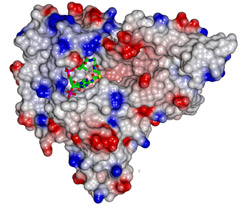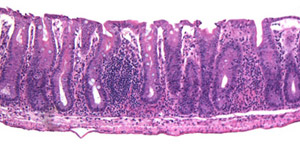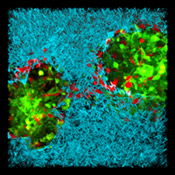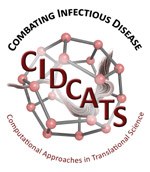Fighting against chronic disease

Staff at the Centre for Immunology and Infection (CII) are at the forefront in the fight against some of the world’s most debilitating and deadly diseases.
The CII is an interdepartmental centre, which brings together scientific and clinical expertise from both the Department of Biology and the Hull York Medical School. The CII was created as part of the University’s response to the growing importance of infectious and non-infectious disease as a determinant of health, both at home and across the world. In its first five years of existence, the CII has won over £16m of external funding to support this vital research, and has made significant advances in translational research.
New interventions against neglected tropical diseases
 The
development of new ways to tackle the parasitic diseases that affect the lives
of hundreds of millions of people in developing countries is an important theme
in the CII. Research on the molecular and cell biology of the parasites
themselves is aimed at identifying an Achilles’ heel that that might serve as a
drug or vaccine target. Studies on the
way in which our immune system tries to fight back are aimed at identifying new
approaches to therapy and vaccination. Recent research successes include the
identification of a new lead compound for drug development against African
sleeping sickness (with the Wellcome Trust-funded Dundee
Drug Discovery Unit), and the development of a new therapeutic vaccine for
visceral leishmaniasis, that will enter a first-in-man clinical trial in 2012
(also funded
by the Wellcome Trust).
The
development of new ways to tackle the parasitic diseases that affect the lives
of hundreds of millions of people in developing countries is an important theme
in the CII. Research on the molecular and cell biology of the parasites
themselves is aimed at identifying an Achilles’ heel that that might serve as a
drug or vaccine target. Studies on the
way in which our immune system tries to fight back are aimed at identifying new
approaches to therapy and vaccination. Recent research successes include the
identification of a new lead compound for drug development against African
sleeping sickness (with the Wellcome Trust-funded Dundee
Drug Discovery Unit), and the development of a new therapeutic vaccine for
visceral leishmaniasis, that will enter a first-in-man clinical trial in 2012
(also funded
by the Wellcome Trust).
Understanding why our immune system can be bad for us
 To combat disease, humans have
evolved an extremely complex array of defenses, collectively called our immune
system. However, sometimes we fall foul of ‘friendly fire’. Researchers in the
CII are trying to learn why an immune system sometimes attacks its own body, a
process that may lead to autoimmune diseases such as Type I diabetes, or
responds inappropriately to the millions of harmless bacteria that live in our
gut, as in the case of ulcerative colitis and Crohn’s disease. The latter diseases
affect almost 200,000 people in the UK, and about 1 in 300 people in the UK may
develop Type I diabetes. In collaboration with the new Wellcome Trust and
Wolfson Foundation-funded Centre
for Hyperpolarisation in MRI, CII staff are also helping to develop new
tools to help study inflammation in the brain, the basis of many neurological
diseases.
To combat disease, humans have
evolved an extremely complex array of defenses, collectively called our immune
system. However, sometimes we fall foul of ‘friendly fire’. Researchers in the
CII are trying to learn why an immune system sometimes attacks its own body, a
process that may lead to autoimmune diseases such as Type I diabetes, or
responds inappropriately to the millions of harmless bacteria that live in our
gut, as in the case of ulcerative colitis and Crohn’s disease. The latter diseases
affect almost 200,000 people in the UK, and about 1 in 300 people in the UK may
develop Type I diabetes. In collaboration with the new Wellcome Trust and
Wolfson Foundation-funded Centre
for Hyperpolarisation in MRI, CII staff are also helping to develop new
tools to help study inflammation in the brain, the basis of many neurological
diseases.
Seeing is believing!
 The
cells that make up our immune system fight microbes not just in the blood, but
also in every tissue in the human body, and it is becoming clear that each
organ shapes how the immune system behaves locally. To understand how this
process works, and help design drugs that might work more effectively in
different target tissues, research in CII is using advanced microscopy
techniques to examine cells as they behave in tissues. Our researchers are
developing organotypic culture models for drug testing and creating artificial
lymph nodes using tissue engineering to allow us to study the human immune
response more effectively.
The
cells that make up our immune system fight microbes not just in the blood, but
also in every tissue in the human body, and it is becoming clear that each
organ shapes how the immune system behaves locally. To understand how this
process works, and help design drugs that might work more effectively in
different target tissues, research in CII is using advanced microscopy
techniques to examine cells as they behave in tissues. Our researchers are
developing organotypic culture models for drug testing and creating artificial
lymph nodes using tissue engineering to allow us to study the human immune
response more effectively.
What makes bacteria virulent?
Many bacterial species are highly successful at invading and surviving within human cells or living in the fluid films that line mucosal surfaces. Deciphering how these bacteria accomplish this complex task underpins much of the work in cellular microbiology that takes place within the CII. Salmonella, a bacterium associated with food poisoning, is of particular interest and ongoing work funded by the Wellcome Trust is aimed at identifying genes that are involved in modifying bacterial surface antigens that are the target of host immunity, and that subvert the function of phagocytic cells. These studies will provide a greater understanding of why some but not all Salmonella cause disease, and open the way for developing new vaccines or diagnostic tools.
Exploiting plasma physics for health care
Bacteria are continuously finding new ways to escape existing antibiotics, making research into new and innovative approaches to eliminate these microbes increasingly important. Working with the University’s new Plasma Institute, the CII has been evaluating the use of cold plasma jets to destroy important bacteria such as E. coli. We are extending these studies to investigate the inactivation of clinically significant microbial biofilms. Applications of this technology in a wide range of health care applications can be envisaged, including decontamination and sterilisation, and potential in therapeutics, such as wound healing and cancer treatments.
Microbicides making an impact in HIV/AIDS
The CII’s clinical research programme in HIV and other sexually transmitted diseases is focused around the conduct of Phase I clinical trials. These studies, conducted in healthy individuals, are the first step in the clinical development pipeline and are essential in making sure that any proposed new drug of vaccine is safe for use in man. With funding from the Bill and Melinda Gates Foundation and the EU, CII staff play a significant role in the development and evaluation of new microbicides and vaccines to prevent HIV infection, with a particular focus on approaches that are safe, effective and easily accessible for women in developing countries.
Training a new generation of ‘computational’ scientists
 Most scientists and doctors are
trained to handle relatively small sets of data, such as might be obtained in a
routine blood test. However, modern molecular science now allows us to collect
thousands of pieces of information on what makes everyone different (their
genetic code) and how individuals respond to infection, or when they are given
a new drug or vaccine. This data explosion requires the training of a new
generation of scientists, with good biological knowledge allied to high-level
skills in computational methods. The CII provides one of the science hubs for a
new and prestigious Wellcome
Trust-funded four-year PhD programme, CIDCATS (Combating Infectious
Disease: Computational Approaches to Translational Science). Funded until 2019, this programme will train
25 young scientists and provide them with the tools to make a difference.
Most scientists and doctors are
trained to handle relatively small sets of data, such as might be obtained in a
routine blood test. However, modern molecular science now allows us to collect
thousands of pieces of information on what makes everyone different (their
genetic code) and how individuals respond to infection, or when they are given
a new drug or vaccine. This data explosion requires the training of a new
generation of scientists, with good biological knowledge allied to high-level
skills in computational methods. The CII provides one of the science hubs for a
new and prestigious Wellcome
Trust-funded four-year PhD programme, CIDCATS (Combating Infectious
Disease: Computational Approaches to Translational Science). Funded until 2019, this programme will train
25 young scientists and provide them with the tools to make a difference.
Further information
